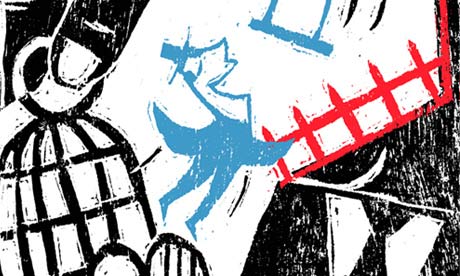Parvathi Menon in The Hindu

ReutersAravindan Balakrishnan, who has been found guilty of offences, including cruelty to a child, false imprisonment and rape and indecent assault.
The details of the story Aravindan Balakrishnan – the 73 year old leader of a bizzare Maoist cult who was yesterday sentenced to life imprisonment for rape, sexual assaults, cruelty to a child, and false imprisonment – are being unraveled in the British media after two members of his collective broke the silence and secrecy that bound them for the last several decades.
The first is his 30-year old daughter, with the pseudonym “Fran” who was born into captivity ; and the second is Josephine Herival, the woman who helped his daughter escape but still insists that Mr. Balakrishnan is innocent.
In the time between his arrival in the United Kingdom in the 1970s as a young student from Malaysia come to study at the London School of Economics – a handsome young bespectacled man in his photograph – to the wizened old man shuffling to the courts accompanied by his wife, as TV images show him today, Mr. Balakrishnan created an alternate world for a group of people who came under his tyrannical control.
The Brixton-based Workers’ Institute of Marxism-Leninism Mao Zedong Thought established by Mr. Balakrishnan, was one of the many splinter groups that emerged in the radicalism of the late 1960s and 1970s in Britain. The bright, charismatic and articulate revolutionary attracted followers, including Sian Davies, Fran’s mother. The group set up office in Brixton, and in 1978 it was raided by the police in search of drugs that were not found. Several of them were arrested, including Mr. Balakrishnan. After this a number of people left and a remaining core slowly shut themselves out from the outside world and retreated into a small cult that revolved around a single leader who became increasingly crazed and despotic, Comrade Bala.
For these people, all women, the leader apparently imposed stringent rules about what they could and could not do or say. Comrade Bala frequently invoked the wrath of a universe-controlling machine called Jackie that would wreak hell and damnation on them if they fell out of step. In 1983, Comrade Bala and Ms. Davies had a daughter, but never revealed the fact to her. In unclear circumstances, in 1996 Ms. Davies fell from the bathroom window of a commune house after apparently becoming mentally ill.
Fran was 13 at the time. She had never been sent to school and was taught to read and write at home, becoming as she grew up a keen diarist. Much of what is known about life in the commune is documented in it. She described herself as a “fly caught in a web” and a “bird in a cage with clipped wings” in an interview to the BBC, in which her face was not shown. Her father used to regularly abuse and beat her and the other women, and tell the little girl who longed to go out and play on the swings with other children, that lightning would strike her dead, or she would spontaneously combust.
Fran made an unsuccessful attempt to escape when she was 22. It was in October 2013 that an opportunity presented itself again. Learning of a charity that rescued women, Fran, who believed she was desperately ill with diabetes, and another commune inmate, Josephine Herival, called the charity, which rescued her. The lid on the commune and its activities was lifted.
Clearly, however, Comrade Bala’s hold continues. Speaking to Channel 4 on Friday, Josephine Herival, insisted he was innocent. “I know Aravindan Balakrishnan…he is such a good person. Anyone who knows him will say the same thing.” She says that the evidence given against him in the court are “outrageous allegations.”
Fran is integrated herself into society well, according to her carers, starting formal studies and even becoming a member of the Labour Party – living life that was denied her for 30 years.

